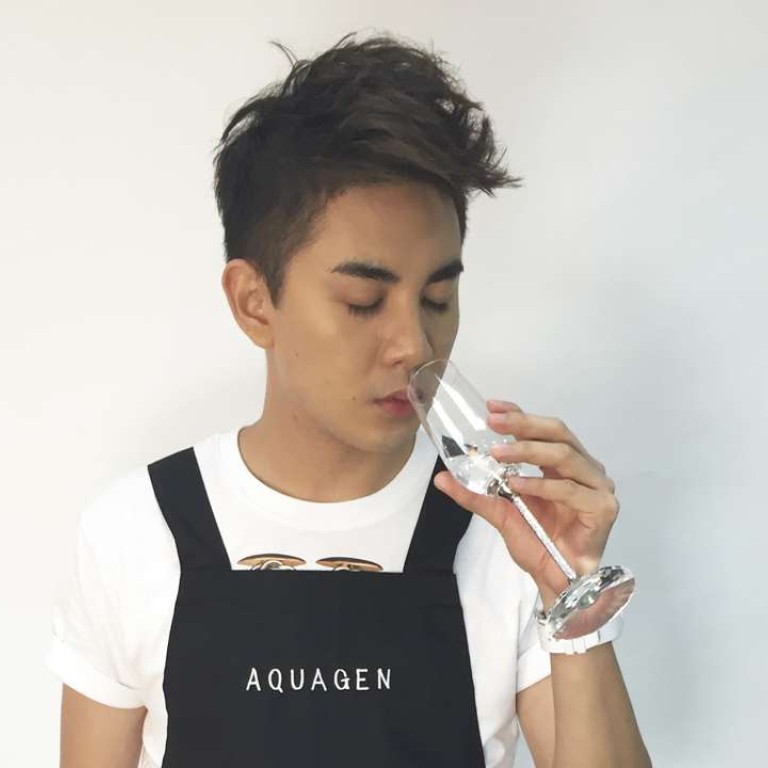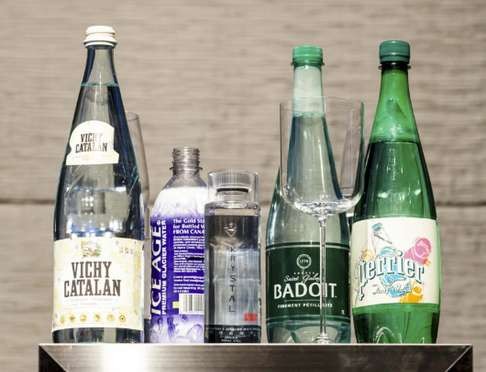
The water sommelier helping firms in China sell fine water to wary middle class
Fresh from China’s first water-tasting event, Michael Mascha explains arts of water appreciation and water pairing, while fellow expert Danny Tsai, adviser to Taiwan bottlers, explains the six grades of water
Many people going to a party bear gifts of wine for their hosts, but Michael Mascha always takes along a bottle of water sourced from drifting icebergs.
“There might be a Bordeaux or some other wine that costs more than a thousand dollars, but at the party, no one talks about the wine. Everybody just wants to try the iceberg water,” he says.
It’s not surprising that the nondescript beverage garners so much attention when you hear Mascha explain how water has given him as much enjoyment as wine once did, if not more, since he gave up drinking.

“Food and wine were always very important to me, but in 2002 my doctor told me that I could continue drinking alcohol or I could live. So I decided to stop,” he says.

“Sometimes, I enjoy light water. Sometimes, I enjoy water with a really high mineral content; sometimes, water with big bubbles. Different bottled waters give me different experiences,” he says.
Mascha aimed to elevate water to haute cuisine status when he set up FineWaters in 2003 – an online encyclopaedia of bottled waters from around the world listing their origin, properties, recommendations for food pairings (matching acidic water with fatty food; sushi with effervescent, carbonated water) and water drinking etiquette (serving light carbonated water at 14 degrees Celsius).
When a water sommelier takes a sip of water, he or she must be able to distinguish the water’s origin and other properties such as carbonation (amount of bubbles), mineral content, nitrate concentration and pH value (acidic or alkaline).
Mascha says it took him a long time to win over cynics who regarded water appreciation as an inane pursuit for elites and people with too much time on their hands.

“For example, one way to differentiate water is how many minerals it has ... water from rainwater collection is very soft and light because there are basically no minerals. But rainwater that seeps into an aquifer and remains underground for a very long time starts absorbing minerals. The more minerals it absorbs, the more heavy the water becomes in sensation and the more characteristics of taste it develops. If you drink the [mineral water] after rainwater, the [mineral water] will feel much more substantial.”
With an eye on the developing China market, Mascha hired his first employee in Shanghai in 2009 to help organise events and deal with media relations. After six years, he is starting to see traction as tastes become more sophisticated.
“Shanghai adopts the latest trends. There are more restaurants offering extensive water menus,” he says. “There’s a growing middle class in China and people want to have new experiences. Fine water is a new experience that doesn’t cost too much. Next year, we will roll out courses and accreditation in China.”
The US-based Austrian national came to Hong Kong last year for the city’s first water-tasting contest, and was in Guangzhou in June this year for China’s first such event, which attracted 40 participants from around the world. It was the first water tasting to have a judging panel comprising five trained and experienced water sommeliers. “We held it in Guangzhou because China is very important to the industry. It’s where all brands want to be,” Mascha says.
Surprisingly for a country known for its heavily polluted waterways, Chinese brand Krystal, whose water is sourced from a volcanic region along the remote Chinese-Siberian frontier, was voted one of the winners by the sommeliers.
Mascha is currently working with Chinese water bottlers to explore new premium water sources in other remote areas. He says he will have his work cut out for him, given Chinese citizens’ distrust of domestic brands. It will be a long, uphill battle, he says.
“Fine water doesn’t come from a country, but from geography. If you think of Patagonia or Greenland [which have pristine water sources], they are very remote places. There are fantastic sources in [mountainous areas in] China, too. We are now in the process of bottling and marketing them with a brand. It makes no sense for China just to import from overseas because you have great water there and just need to start exploiting it.”
There is a vast number of bottled water brands around the world, mostly cheap, filtered tap water,
sometimes with added minerals. In the premium category, there are about 3,000 brands of bottled mineral water from natural sources such as mountain springs, icebergs and rainwater.

Another place where water tasting is popular is Taiwan. Danny Tsai is one of the five water sommeliers on the island. Tsai became a brand manager for a water bottler in Taiwan after completing six months of training. The former media professional says because there are so few sommeliers, they can earn a high salary – up to HK$7,000 per event, according to Tsai – at private water tasting events.
“We recommend which water should go with a particular wine and food. For example, food with a heavy taste, like steak, should go with red wine and heavily carbonated water with lots of bubbles. Non-bubbly water should be drunk with light-tasting food such as sushi.”
To maintain a clean palate, Tsai says he exercises strict dietary discipline. “I don’t smoke or eat mutton or beef, and seldom drink fizzy and sugary drinks. One day before a water tasting, I won’t eat spicy or deep-fried foods. I also abstain from alcohol three days in advance.”
For a water sommelier, Tsai says a glass of water can be categorised into six grades, with the lowest being tasteless and the highest perceivable by nose.
“After taking a sip, instead of instantly swallowing it, I hold it in my mouth to better discern its properties. It’s just like tea appreciation,” he says.
Tsai, whose Facebook is filled with photos of him holding bottled waters in different scenic spots, says water sommelier is an interesting and important job.
“Sun, air and water are the basic elements of life. Water is very important. But there are not many people out there who assess water quality. When I go travelling, I always try to buy all the bottled water brands for tasting. As the world gets more polluted and the general population develops a more refined taste as a result of rising wealth, our profession is set to grow.”
For Mascha, rather than waving goodbye to his bon vivant days by swearing off alcohol, his newfound profession in water appreciation only further ignites his epicurean passions.
“Drinking good water is not so much about healthy living as about enjoying life. Food is one of the great experiences you can have in life. People overeat the same food. I enjoy eating different kinds of food. When I visit China, I never eat in big hotels where you get Westernised food. I like to go to street markets and small restaurants that do different local dishes. I believe if you eat good food, you live healthy, and good food has to be matched with good water.”
Not being able to drink alcohol and having to consume water with his meals may have initially been a blow to Mascha, “but when you wake up the next morning, you don’t have a hangover”.
Whether water has taste has been a moot point in philosophy and science. Aristotle wrote: “The natural substance water per se tends to be tasteless.” Psychologists, neurologists and physiologists also think that water has a flavour, but only as an aftertaste after tasting other things. The fact that water sommeliers are employed by bottled water manufacturers leads some cynics to think that this is nothing more than public relations flimflam promoting their premium products. Water sommeliers create water menus for high-end restaurants which result in increased water sales, further entrenching cynics’ derogatory perceptions of water sommeliers.

